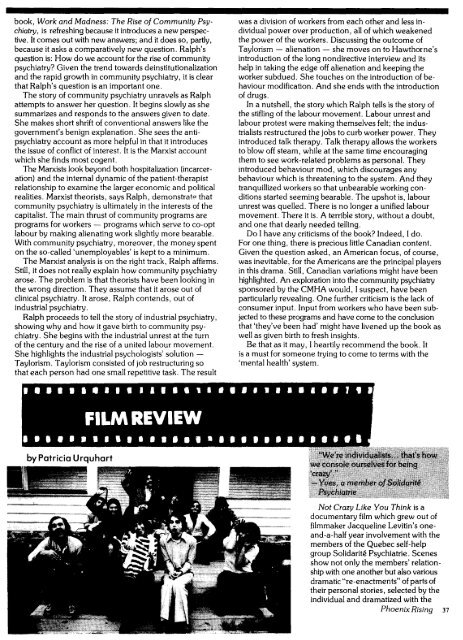Vol. 5, No. 4 - Psychiatric Survivor Archives of Toronto
Vol. 5, No. 4 - Psychiatric Survivor Archives of Toronto
Vol. 5, No. 4 - Psychiatric Survivor Archives of Toronto
Create successful ePaper yourself
Turn your PDF publications into a flip-book with our unique Google optimized e-Paper software.
ook, Work and Madness: The Rise <strong>of</strong> Community Psychiatry,<br />
is refreshing because it introduces a new perspective.<br />
It comes out with new answers; and it does so, partly,<br />
because it asks a comparatively new question. Ralph's<br />
question is: How do we account for the rise <strong>of</strong> community<br />
psychiatry? Given the trend towards deinstitutionalization<br />
and the rapid growth in community psychiatry, it is clear<br />
that Ralph's question is an important one.<br />
The story <strong>of</strong> community psychiatry unravels as Ralph<br />
attempts to answer her question. It begins slowly as she<br />
summarizes and responds to the answers given to date.<br />
She makes short shrift <strong>of</strong> conventional answers like the<br />
government's benign explanation. She sees the antipsychiatry<br />
account as more helpful in that it introduces<br />
the issue <strong>of</strong> conflict <strong>of</strong> interest. It is the Marxist account<br />
which she finds most cogent.<br />
The Marxists look beyond both hospitalization (incarceration)<br />
and the internal dynamic <strong>of</strong> the patient-therapist<br />
relationship to examine the larger economic and political<br />
realities. Marxist theorists, says Ralph, demonstrate that<br />
community psychiatry is ultimately in the interests <strong>of</strong> the<br />
capitalist. The main thrust <strong>of</strong> community programs are<br />
programs for workers - programs which serve to co-opt<br />
labour by making alienating work slightly more bearable.<br />
With community psychiatry, moreover, the money spent<br />
on the so-called 'unemployables' is kept to a minimum.<br />
The Marxist analysis is on the right track, Ralph affirms.<br />
Still, it does not really explain how community psychiatry<br />
arose. The problem is that theorists have been looking in<br />
the wrong direction. They assume that it arose out <strong>of</strong><br />
clinical psychiatry. It arose, Ralph contends, out <strong>of</strong><br />
industrial psychiatry.<br />
Ralph proceeds to tell the story <strong>of</strong> industrial psychiatry,<br />
showing why and how it gave birth to community psychiatry.<br />
She begins with the industrial unrest at the turn<br />
<strong>of</strong> the century and the rise <strong>of</strong> a united labour movement.<br />
She highlights the industrial psychologists' solution <br />
Taylorism. Taylorism consisted <strong>of</strong> job restructuring so<br />
that each person had one small repetitive task. The result<br />
was a division <strong>of</strong> workers from each other and less individual<br />
power over production, all <strong>of</strong> which weakened<br />
the power <strong>of</strong> the workers. Discussing the outcome <strong>of</strong><br />
Taylorism - alienation - she moves on to Hawthorne's<br />
introduction <strong>of</strong> the long nondirective interview and its<br />
help in taking the edge <strong>of</strong>f alienation and keeping the<br />
worker subdued. She touches on the introduction <strong>of</strong> behaviour<br />
modification. And she ends with the introduction<br />
<strong>of</strong> drugs.<br />
In a nutshell, the story which Ralph tells is the story <strong>of</strong><br />
the stifling <strong>of</strong> the labour movement. Labour unrest and<br />
labour protest were making themselves felt; the industrialists<br />
restructured the jobs to curb worker power. They<br />
introduced talk therapy. Talk therapy allows the workers<br />
to blow <strong>of</strong>f steam, while at the same time encouraging<br />
them to see work-related problems as personal. They<br />
introduced behaviour mod, which discourages any<br />
behaviour which is threatening to the system. And they<br />
tranquillized workers so that unbearable working conditions<br />
started seeming bearable. The upshot is, labour<br />
unrest was quelled. There is no longer a unified labour<br />
movement. There it is. A terrible story, without a doubt,<br />
and one that dearly needed telling.<br />
Do I have any criticisms <strong>of</strong> the book? Indeed, I do.<br />
For one thing, there is precious little Canadian content.<br />
Given the question asked, an American focus, <strong>of</strong> course,<br />
was inevitable, for the Americans are the principal players<br />
in this drama. Still, Canadian variations might have been<br />
highlighted. An exploration into the community psychiatry<br />
sponsored by the CMHA would, I suspect, have been<br />
particularly revealing. One further criticism is the lack <strong>of</strong><br />
consumer input. Input from workers who have been subjected<br />
to these programs and have come to the conclusion<br />
that 'they've been had' might have livened up the book as<br />
well as given birth to fresh insights.<br />
Be that as it may, I heartily recommend the book. It<br />
is a must for someone trying to come to terms with the<br />
'mental health' system.<br />
by Patricia Urquhart<br />
<strong>No</strong>t Crazy Like You Think is a<br />
documentary film which grew out <strong>of</strong><br />
filmmaker Jacqueline Levitin's oneand-a-half<br />
year involvement with the<br />
members <strong>of</strong> the Quebec self-help<br />
group Solidarite Psychiatrie. Scenes<br />
show not only the members' relationship<br />
with one another but also various<br />
dramatic "re-enactments" <strong>of</strong> parts <strong>of</strong><br />
their personal stories, selected by the<br />
individual and dramatized with the<br />
Phoenix Rising 37
















